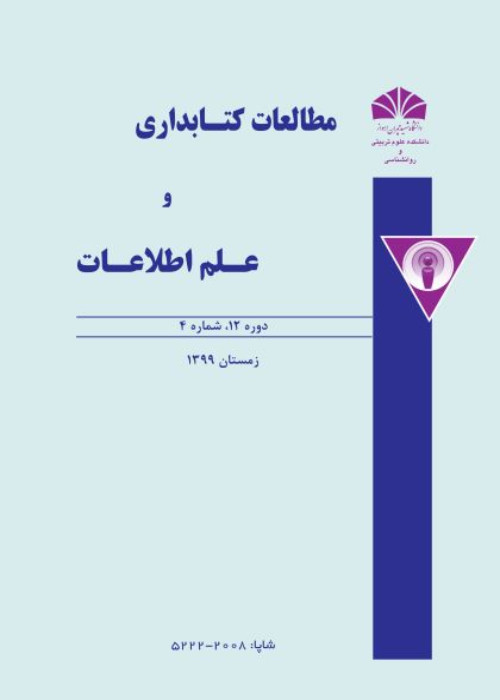A Survey of Barriers of Knowledge Sharing and Offreing Guidelines to Improve KS among Kermanshah Public librarians
The aim of this study is to identify the status of knowledge sharing to determine the attitude of librarians towards knowledge sharing, to identify the potential barriers and to put forward effective solutions to improve the knowledge sharing in the public libraries of Kermanshah province.
This study is as an applied study which has been carried out using survey method. It is also a quantitative study in terms of the type of data. For data collection, there was used a standardized questionnaire prepared by Chung, Yoon and John (2014). The research populations of the study included the librarians and managers of public libraries of Kermanshah province. In 2016, 69 public libraries with 181 librarians and managers have been active in public libraries. Based on Cochran formula, there are 123 samples in this study. It is worth mentioning that, in order to ensure about returning the questionnaires, there were distributed more questionnaires than needed (135); however all the questionnaires were returned. Data analysis was done in two parts of data description and inferential analysis using SPSS software.
The results showed that gender, marital status, major of study (except for the component of strategies of knowledge exchange improvement), education level, age and employment background of librarians have not been effective on the process of knowledge sharing and knowledge exchange in the public libraries of Kermanshah Province. Employment background is effective on the process of acquiring knowledge and strategies of knowledge exchange improvement; also, the librarians’ major of study is effective on the strategies of knowledge exchange improvement in the public libraries of Kermanshah Province. The city of employment has no effect on the process of knowledge sharing, but on the barriers of knowledge sharing instead. Regarding the different ways of knowledge exchange, the results showed that about 80 percent of librarians have reported informational and communicational technologies; about 54 percent, meeting with colleagues; 43 percent, social networks; about 24 percent, counseling method; about 15 percent, seminars or workshops and 0.7 percent have reported storytelling as the most common ways of knowledge exchange. 35.6 percent of librarians have used only one of the instruments of knowledge exchange; 26.7 percent have used two options; 25.9 percent, three options; 11.1 percent, four options and 0.7 percent of the librarians have used five options for knowledge exchange. Of the librarians who have used informational and communicational technologies for knowledge exchange, 45.2 percent have used telephone; 32.6 percent, e-mail; 23.7 percent, electronic discussion groups; 14.08 percent, weblogs and 14.08 percent have used the organization’s portal for knowledge exchange. The librarians have reported the followings as the main obstacles in the way of knowledge sharing: lack of a true rewarding system, lack of a system to introduce the individuals requiring knowledge sharing, also the weak verbal and written communications as well as weakness in interpersonal skills. From the view point of the librarians of Kermanshah province, the role of technology in the improvement of knowledge exchange and using newsletters and similar instruments in knowledge sharing are among the most significant strategies in promotion of knowledge exchange.
The librarians have reported informational technology, meeting colleagues, social networks, consulting method, workshop and storytelling as the most common ways of knowledge exchange. They have also listed the followings as the most important barriers in the way of knowledge exchange: lack of a true rewarding system, lack of a system to introduce people who need knowledge exchange, weak oral and written interactions and weakness of internal skills. From the view point of the librarians, the role of technology in the improvement of knowledge exchange and using newsletters and similar instruments in knowledge sharing are among the most significant strategies in promotion of knowledge exchange.
- حق عضویت دریافتی صرف حمایت از نشریات عضو و نگهداری، تکمیل و توسعه مگیران میشود.
- پرداخت حق اشتراک و دانلود مقالات اجازه بازنشر آن در سایر رسانههای چاپی و دیجیتال را به کاربر نمیدهد.


